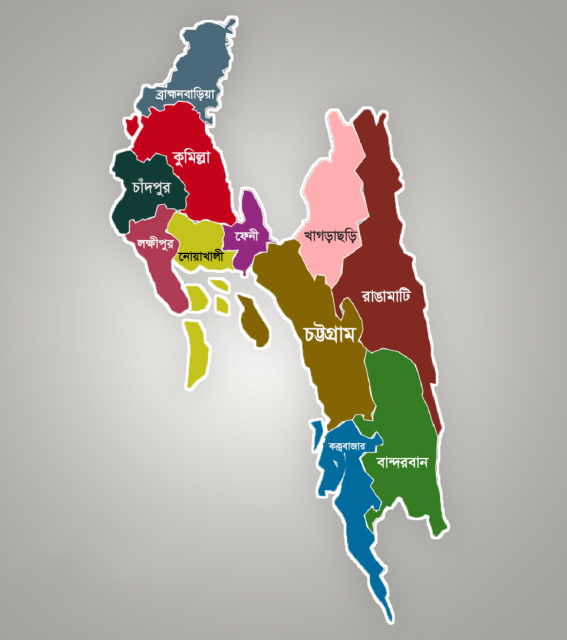Chittagong District: A Journey Through History and Nature
Chittagong (officially Chattogram) is the main international seaport and second largest city in Bangladesh, on the Bay of Bengal. The city is the headquarters of many Bangladeshi companies, including the Chittagong Stock Exchange. According to the British newspaper The Telegraph, Chittagong is one of the ten fastest-growing cities in the world.

Patenga sea beachKarnaphuli River at night with a view of Chittagong Port
Chittagong is one of the great port cities of Asia. It flourished on the Maritime Silk Road and was the eastern terminus of the Grand Trunk Road. It was visited by famous medieval explorers like the Venetians Niccolo de Conti and Caeser Frederick; the Arab traveller Ibn Battuta; and the Chinese admiral Zheng He. The Portuguese, Mughals and British controlled the port in successive periods until the 20th century. It became a major financial centre and the largest port in modern-day Bangladesh after the Partition of British India.
Today, Chittagong is a fairly large metropolitan area with a population of about 6.5 million. As in Dhaka, its streets are filled with masses of rickshaws. Rolling hills and greenery dot the landscape. The Karnaphuli River is a burgeoning hub of shipping. Chittagong puts in a little more effort than other Bangladeshi cities to keep its streets and sidewalks clean. The city’s residents are called Chittagonians. Foreigners will notice a distinct increase in nuisance from beggars in certain intersections, like the Central Railway Station. Beggars come from different parts of Bangladesh because Chittagonians are more prone to charity than people in other parts of the country.
Chittagong District: Where Culture and Adventure Meet
The old quarter of the city is home to several historic mosques and Sufi shrines. The Anderkilla Imperial Jame Mosque was built by the Mughals after they conquered Chittagong in 1666. It once formed part of a large hilltop fort. The Sufi Shrine of Bayazid Bostami has a pond full of turtles. The former Portuguese settlement is located in Patherghatta. It is home to the descendants of Portuguese traders, who are known locally as Firingis. The area has several churches, including the Roman Catholic Diocese of Chittagong. Chittagong is also the seat of the Bengali Buddhist priesthood.
The busiest parts of the city are Station Road, Strand Road, GEC Circle and O.R. Nizam Road. The affluent neighborhoods of Khulshi and Nasirabad are home to the city’s middle and upper classes. Chittagong has many influential business families.
The city is home to prominent gentlemen’s clubs, restaurants and golf courses.
The Chittagonian enthusiasm for inviting people to massive feasts is a bit of legend both locally and elsewhere. Known as mezbani these feasts feature a tremendously hot curry, usually of beef. If you’re not used to it, approach with caution. You might also be able to find some of the world’s best lobsters here, as Chittagong is the center of the Bangladeshi seafood industry.
Climate
| Chittagong | ||||||||||||||||||||||||||||||||||||||||||||||||
| Climate chart (explanation) | ||||||||||||||||||||||||||||||||||||||||||||||||
|
||||||||||||||||||||||||||||||||||||||||||||||||
|
||||||||||||||||||||||||||||||||||||||||||||||||
Chittagong has a tropical monsoon climate: hot and very humid during the summer monsoon season (April-September) and drier and cooler in the winter (October-March). The city is vulnerable to North Indian Ocean tropical cyclones. The deadliest tropical cyclone to strike Chittagong was the 1991 Bangladesh cyclone, which killed 138,000 people and left as many as 10 million homeless.
Economy
The contribution of Chittagong to the national GDP of Bangladesh is about 12 per cent. Chittagong contributes 40% of Bangladesh’s industrial output, 80% of international trade and 50% of government revenue. As of June 2015, Chittagong Stock Exchange had a market capitalization of $32 billion with over 700 listed companies. Major Bangladeshi companies such as M. M. Ispahani Limited, BSRM, AK Khan & Company, PHP Group, James Finley, Habib Group, S Alam Group of Industries, CMark Group, KDS Group and TK Group of Industries etc. have offices in Chittagong. State-owned companies include Pragati Industries, Jamuna Oil Company, Bangladesh Shipping Corporation and Padma Oil Company. The Special Economic Zones include the Karnaphuli EPZ and the Korean EPZ. Major industrial sectors include petroleum, steel, shipbuilding, chemicals, pharmaceuticals, textiles, jute, leather products, vegetable oil refineries, glass manufacturing, electronics and motor vehicles. In 2011-12, Chittagong exported readymade garments worth about US$ 4.5 billion to the international market. International banks like HSBC, Commercial Bank of Ceylon, National Bank of Pakistan, Standard Chartered, Citibank NA and Habib Bank Limited operate their operations in Chittagong.
Language
Local residents of Chittagong speak the Chittagonian language. However, signboards and bus/train stations have instruction signs both in Bengali and English.
See the most popular tourist places to visit in Chittagong Bangladesh?





